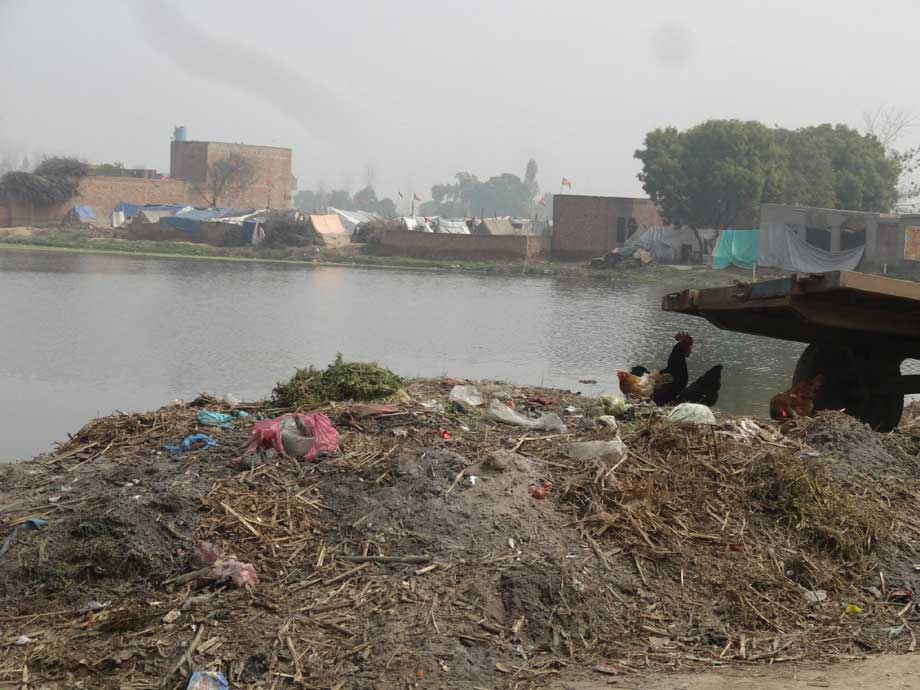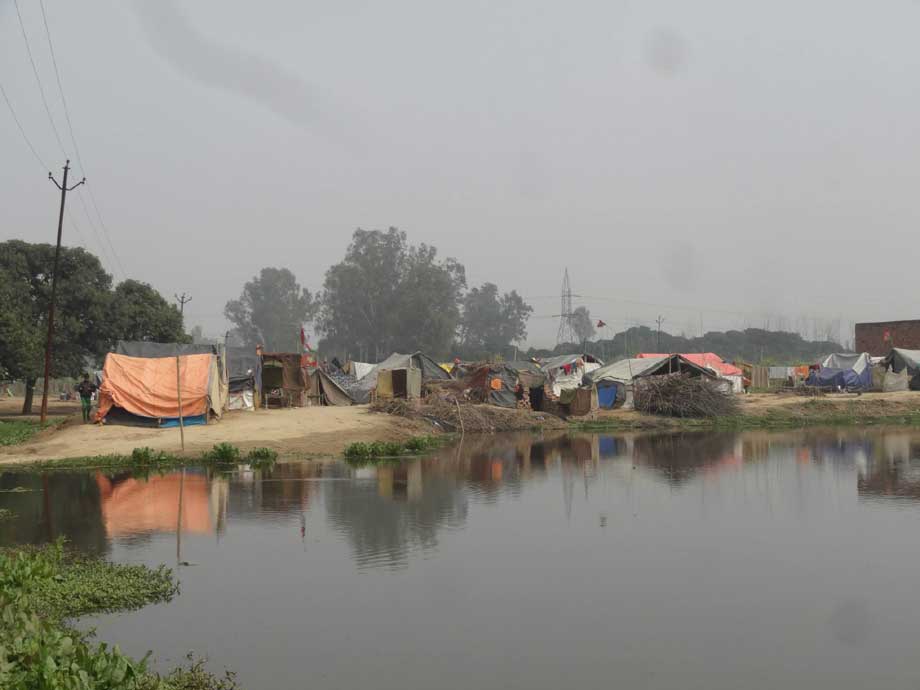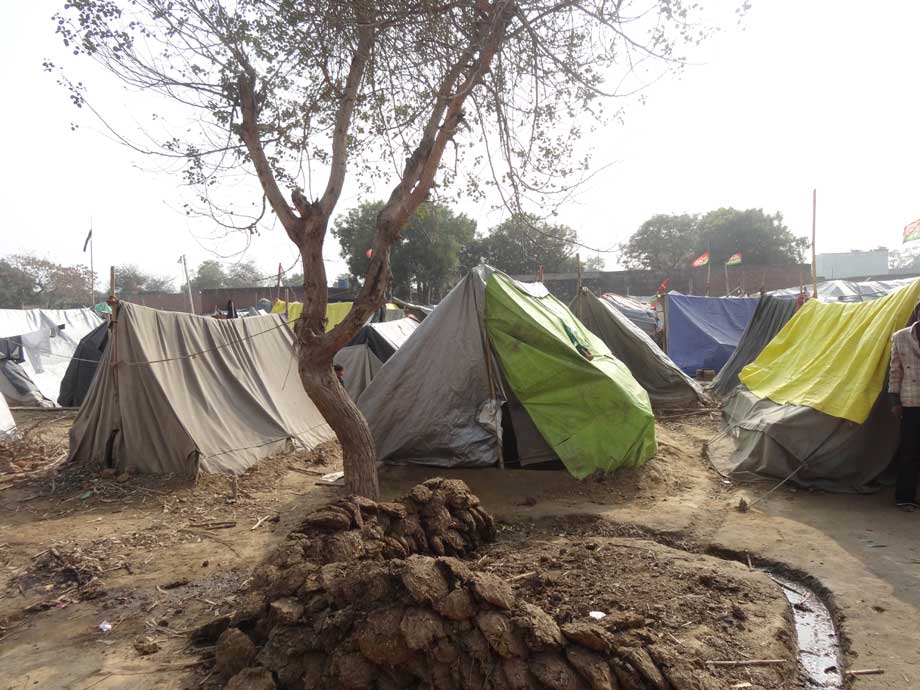Muzaffarnagar Diaries: From The Killing Fields Of Phugana
By V. Arun Kumar
11 March, 2014
Countercurrents.org
Is saal danga bahut hua,
bahut hui hai khoon ki baarish,
agale saal acchi hogi fasal matdaan ki.[This time there were many riots.
much blood got spilled
Next year there will be a good harvest.
A harvest of votes.]Danga(Riot) by Gorakh Pandey
The dawn of a lucid hope amidst the strong stench of horror and injustice is in the air of Muzaffarnagar. The endless waves of sugarcane fields which once witnessed a cordial, though hierarchical relationship between Jats and Muslims, today is stinking with the smell of hatred and distrust. I am not sure whether to call the whole episode a riot or genocide, but the chilling narratives of nightmares which fell upon them will send shivers down one’s spine. The wave of hatred started soon after BJP's Amit Shah (Goebbels of Narendra Modi) took charge of UP political akhara, to ensure a good harvest of votes for his master (NaMo).
It was early the morning of 8th September 2013. As usual Muslims in the Phugana village were getting ready to work in the sugarcane fields of Jats. Many were unaware of the violence that broke out the previous day in the village of Kawal after the mahapanchayat, just 10 km from Muzaffarnagar. And those who were aware never suspected any untoward incidents happening in their village. As one of the refugees said, “We were living together with Jats for generations and we never had any fight with them”. But on this day things were to change. Soon the sugarcane fields around Phugana turned into killings fields. Amid murder ands rapes many ran for their lives, the police who were supposed to protect, decided to turn a blind eye to the distress cries. “We tried calling the Phugana police station for help but no one responded and after sometime phones at police station went dead” says Shafeeq, a 21 year old young man whose life turned upside down on that day.
People ran towards the sugarcane fields to save their lives. It’s the dense fields of sugarcane which protected them from the Jats, but for some this became a death trap. Two Muslim were killed on that day in Phugana which even the official reports also records. But what went unreported in the beginning were the brutal gangrapes of Muslim women. It was only recently after the intervention of SIT that the police decided to wake up and take action on seven rape cases registered under the Phugana police station (PS). But till now police didn’t succeed in arresting 21 out of 22 culprits in the rape cases. The inchagre of Phugana PS argues that they are unable to arrest the rest of the culprits because the women in the Jat village are protecting them and they can’t use force on women. “Nonsense, they are lying” angrily reacts a rape survivor, “it is just an excuse. Why can’t they use women police? Just because the culprits are Jats they are hesitating to arrest them. Most of them [Police] are Jats.”
It was fortunate for Muslims of Phugana that Loi, a Muslim dominated village, was just 10 minute distance from Phugana. Otherwise, situation would have been very different and there would have been a bloodbath. “It was a nightmare. We all ran towards Loi. Where else we could have gone? We were sure going to police station was useless” says Zafar with tears in his eyes. Others who were struck in the sugarcane jungle were retrieved by Provincial Armed Constabulary personals and were left at Loi village. Around four hundred families took refugee in Loi village.
Even today things haven't changed much, houses of Muslims who left the Jat dominated villages are being destroyed under the nose of police. Though police argued that they have videographed the houses left behind by Muslims in Jat areas and are ensuring that they are not destroyed, but Asif’s case contradicts the police’s claims. Asif told me that just few days back only he got a call from a Jat boy who was his neighbour and is in army He said that Jats are breaking down his house. “He told me to that I can come and collect bricks and what ever is left of my house” says Asif, “ he was kind, at least there are some people who have some humanity left in them….”. “They are all the same” Sabil, a middle aged man interrupt angrily and says “What human? If they were humans they wouldn’t have done this to us. We can’t trust them now.”

When we visited the Loi village, it was already six months since the riots took place. But things are nowhere seems to be good. Though the violence is over, but the nightmare still haunts many. Though they are in a Muslim dominated area which gives them some sense of security, what lies ahead for them is a long and treacherous road towards rebuilding their lives and getting justice.
These paths are never easy. The government have provided a compensation of Rs. 15 Lakhs for those who were killed in riots (recently increased after intervention by the Supreme Court) and Rs. 2 Lakhs for the mothers whose children died in relief camps. Others affected were given a compensation of Rs. 5 Lakhs. But the problem comes in the way compensation is being provided. Shakeen argues “I have a big family- two sons, one daughter, two daughter-in-laws and three grandchildren- and we got was mere Rs. 5 Lakhs. Even those who just have a wife and one child got the same. Is it fair?”
Most of the Muslims were working as labourers in the sugarcane fields of Jats; barring one family who owned agriculture land. Most of the people in the unofficial refugee camp of Loi are not sure how they will sustain themselves after what ever compensation money they have dies up. Now, with the option of working in Jats’ fields closed, the younger population of the relief camps are migrating to other states in search of work. The old and people with health problems have no option but to sit idle at home.
We also had a short stop at Phugana police station. And what we got from there was a pre drafted story script and wonderful acting by local police officers who gave us the details about the cases and happily telling their police story. According to police officials out of the seven rape cases registered, six were confirmed true and one was found false after investigation.
"The tradition of the oppressed teaches us that the 'state of emergency' in which we live is not the exception but the rule"
Walter Benjamin (1940)

The Narendra Modi ‘wave’ is not a pleasant breeze; it is the wind of polarisation aimed at throwing this nation into the hands of fascist forces. Modi ki Hawa (Modi’s wave) is aimed at spilling blood, as it did in 2002 Godhra genocide. Unfortunately, Muzaffarnagar fell in the path of this attempt by right wing forces to polarise this country and garner votes. Muzaffarnagar was not a sudden outburst, according to some villagers they were aware of outside right wing elements trying to polarise the communities living in Muzaffarnagar.
The riot survivors are not sure whether or not they will get any justice, but only thing they are sure is that if they die today at least their body will cremated and not destroyed, which happened to many who vanished into thin air without any traces.
Quest for survival continues.......
*All names are changed.
V. Arun Kumar is a left wing political activist and a student of Masters in International Relations at South Asian University, New Delhi. He had accompanied his friends, who are students of Masters of Law at South Asian University, for their academic research to Loi village on 23rd February 2014. Arun can be contacted at [email protected] or https://www.facebook.com/arun.worldpeace
Comments are moderated

